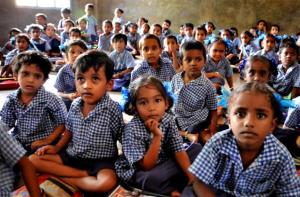What happens when democratic governments led to many populist schemes? Is it okay when the government begins to distribute freebies, be it colour TV sets or wet grinders, cash handouts to win elections? There would be widespread corruption and mis-management of affairs. Already we have seen how the high and mighty has fallen? The Chief Ministers have appeared in the court halls and even went to serve time in jails!
Criminalisation of democratic politics is now becoming an increasing reality. The outcome of such a public life leads to all-round deterioration. When it comes to many welfare schemes, education, healthcare and other services, be it pensions and other services the common citizens expect further ease in rules and regulations. In education, this expansion of further facilities, say, higher education in particular is seriously affected.

The spread of primary education in the first phase of freedom, in the 50s and 60s saw very good positive developments and created a healthy society. First, opening of more schools and more infrastructure, class rooms and playgrounds etc. created an all-round good feeling and a sense of community and friendly feelings.
For instance in Cambodia a Leftist government was in power for some 30 years; even the present government is the same under the same old Prime Minister. Driving from the the Cambodian capital Phnom Penh, through the countryside, some 300 and odd miles or so from the capital to the historic temple complex, Angkor Wat, we were impressed by the neat and clean primary schools in villages, all uniformly built afresh, white washed walls and tiled roofs. In contrast Indian rural primary schools were not so uniformly built or kept up. Only when you read the history of Cambodia you realise the country was ruled by the Communist regime!
The notorious Khmer Rouge regime, the ultra-Maoist group (1975- 1979) and the Pol Pot brought such havoc reminiscent of the Hitler years. Only once we know of what it means genuine freedom and democracy. We can fully understand the cultural and educational past and the present. Only in such dictatorial countries you seem to have such state-imposed discipline!
Recently two of the top leaders were given sentences to “life in prison.” India was a colonial country for long and what we had as education, in our opinion, seems a sort of uniformity, following the official line and our education even today is a sort of mechanical CBSE syllabus and there is no vitality in our education. This is about our secondary education pattern.
More and more it has become a licensing authority, we mean the CBSE. The result is that there is further commercialisation of education. Exams in Indian schools have crushed all originality and a sense of creativity. There are schools that promise 100% pass and the society has resigned to educators turned money spinners.
There are many instances; the Delhi University campus colleges, in one instance, the entire batch of students from the commerce stream are filled from one coaching school from down South! The very admissions policy of such a university like Delhi is so flawed. What is the rationale of taking only the pass marks as the entry criteria for a university course?
We in India have to look at some of the best universities in the world. At Oxford and Cambridge we see an entirely different admission process. For the whole of some 30 odd Oxford Colleges, there is only one common application form and the University has a common test and interview to assess the aptitude of the student for pursuing a particular course, say, Philosophy, Politics and Economics(PPE) or a different course like Classics. The student must have an aptitude to pursue a particular course.
In the US still more freedom is allowed for a student to take a different combination of subjects. At least there is some screening for pursuing a higher education course.
Here in India, it is school exams and various competitive exams and marks in such exams are the only criteria for entry to a course. Just now we read that in India even an entry into, say, the agriculture university, there is only the marks and as a result, we learn that the major Agriculture University in Bangalore has admitted something like 60% girls and what these large number of girls would bring to agriculture which stands today marked by drought and large scale suicides by farmers.
Agriculture and related fields do not have conducive environment, especially for girls to pursue as careers. Maybe, even the boys who enter into agriculture universities opt for careers into non-agri sectors like banks or government jobs! We all know that how many educated youth are unemployed and for each even menial jobs; applicants come in such large numbers with even such degrees like Ph.Ds.! We need a radical thinking and mindset to radically reform the moribund education sector!